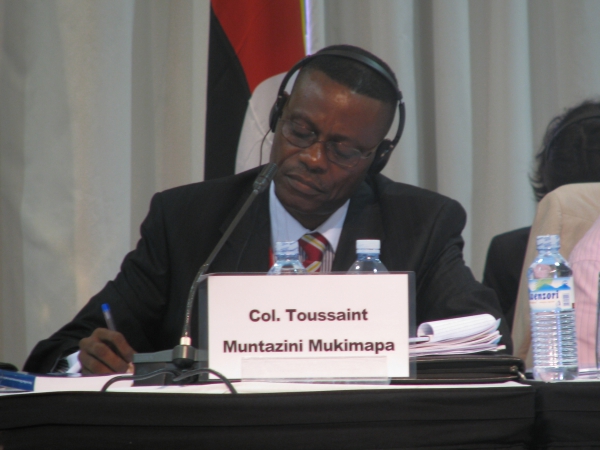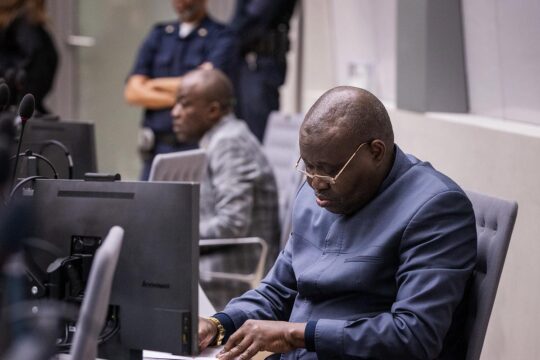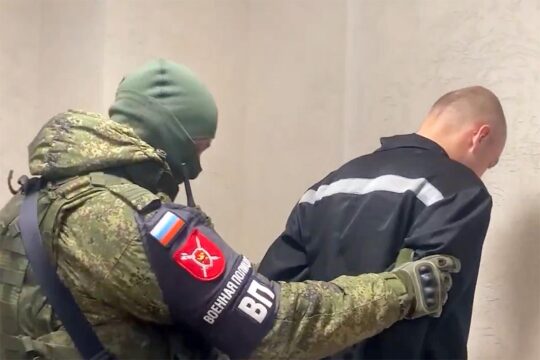On February 14, Central African Republic (CAR) president Faustin-Archange Touadéra signed a decree appointing the Prosecutor of the country’s Special Criminal Court (SCC). The appointment of jurist and military man Colonel Toussaint Muntazini Mukimapa, a military prosecutor in the Democratic Republic of Congo (DRC), is an important step towards the setting up of the SCC, which has a mandate to try suspected perpetrators of serious human rights violations committed in the CAR since 2003. But the Prosecutor’s task will be difficult in a country where more than half the territory is still in the hands of armed groups who continue to commit crimes against the civilian population.
The law to create a Special Criminal Court within the CAR judicial system was promulgated in June 2015 by transition president Catherine Samba-Panza. This court is meant to supplement the work of the International Criminal Court (ICC), to which the same government of Catherine Samba-Panza referred the situation in the CAR since August 2012. The new court, which is to be composed of national and international judges and staff, is mandated to investigate and try serious violations of human rights committed in the CAR since 2003.
Its temporal jurisdiction is thus more extensive than that of the Extraordinary African Chambers (EAC) which covered only the 8 year rule of Chadian ex-president Hissène Habré (1982-1990), now awaiting an appeals decision after being sentenced to life. The task entrusted to the Congolese magistrate is not only immense but difficult, notably because some of the people accused by international human rights organizations like exiled former presidents Michel Djotodia and François Bozizé still have links to the highest echelons of power in the CAR. While these two could in principle be tried by the ICC (which opened an investigation in 2014), there are other suspects who still hold “positions of power or influence”, as noted by Amnesty International central Africa researcher Balkissa Ide Siddo in a recent interview with JusticeInfo. Reconciliation among Central Africans will depend at least in part on who the Prosecutor decides to prosecute. His work on justice will also provide valuable jurisprudence for the CAR’s national courts.
Impunity
“The Central African Republic has been the theatre of repeated cycles of horrific abuse for over a decade, without any consequences for those responsible,” said 17 Central African and international human rights organizations on the eve of a CAR donor conference in Brussels in November 2016. “After nearly a decade of intermittent conflict, in late 2012, the Central African Republic spiralled into violence, with armed groups known as the Seleka and anti-Balaka committing serious abuses against civilians including murder, sexual violence, and destruction of property, which led to massive displacement.” The 17 NGOs, which include Human Rights Watch, Amnesty International and the International Federation for Human Rights (FIDH), urged donors to provide “technical, financial, and political support” for the Special Criminal Court to make it operational. It is likely to cost an estimated 40 million US dollars for the first five years, of which only 5 million had been provided at the time of the organizations’ appeal.
Investigations opened by the International Criminal Court in The Hague may provide victims with another indispensable path to justice, said the NGOs in another declaration the same day, but will simply not be able to deal with more than a decade of international crimes and will likely target only a handful of suspects. Hence the Special Criminal Court is vital, they said.
Another concern raised by the NGOs is the security of staff of the future Special Court. “Security for core judicial staff is also important; judges, prosecutors, and lawyers cannot effectively do their jobs if they fear for their safety,” the groups said. “Protection for victims and witnesses is similarly critical.”
Armed groups
The work of the Special Court, especially its Prosecutor and his team, will be all the more difficult since the security situation in the CAR continues to deteriorate, despite the setting up of democratic institutions a year ago. “Little progress has been made outside Bangui in restoring the authority of the State, especially with regard to security forces and judicial and administrative staff,” said Marie-Thérèse Keita-Bocoum, UN independent expert on human rights in the CAR. “The armed groups control over 60% of the territory, enjoying total impunity. They have taken the place of the judiciary and are terrorizing the population.”
These groups include the Union for Peace in the Central African Republic (UPC) which from its fief in the central prefecture of Ouaka is “carrying out its killing sprees with no fear of punishment, despite the presence of United Nations peacekeepers”, according to a February 16 press release from Human Rights Watch. The US-based NGO accuses the UPC of committing “war crimes”. How will it be possible to investigate in this region without risk of falling victim to the same abuses?







